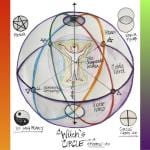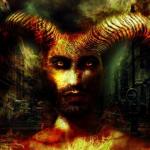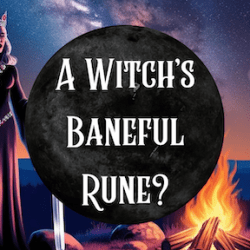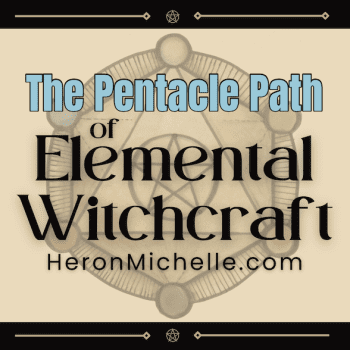I don’t claim to be Wiccan, despite much of my practice being based on what I know of Wicca. Like all the witchlings of the 90’s I memorized my copy of Wicca: A Guide for the Solitary Practitioner by Scott Cunningham, hallowed be his name.
I aspired to be initiated into the Gardnerian lineage, but alas, my path led elsewhere. I accept that the American Wicca of Cunningham’s works is not exactly the same thing as the British Traditional Wicca (BTW) that emerged in 1950’s England. BTW is a very specific form of neo-pagan religion that reaches back in a lineage of initiations to the teachings of Gerald Gardner.
I respect the differences there. As it happens, I also know my praxis and religious paradigm are very different from both Cunningham’s and Gardner’s Wicca at this point. Their apples and my pears are not the same thing – close, but not enough. So I choose a different name for what I do. This inevitably leads to the question, what is the difference between British Traditional Wiccan Witchcraft and what I call Modern Witchcraft?
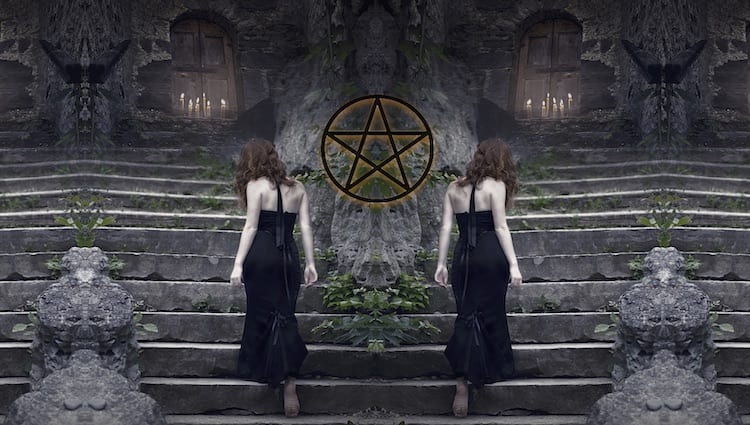
This is tricky. To even broach the subject in a public forum is to strike the match for your own witch-burning. There is nothing centralized about witchcraft – no official bi-laws to reference. There are no globally recognized authorities, nor governing bodies to ask. There is no agreed-upon definition for much of anything pertaining to the Craft, which is how we like it. Radically sovereign and willful, the lot of us. So each witch you meet, and each book you pick up, can speak for that individual and author alone.
That being said, here is how I see what I do in context to Wiccan Witchcraft that I’ve encountered and studied thus far:
A Silly Analogy:
Modern Witchcraft is like the American first cousin to a proper, respectable British family which were steeped in tradition. They grew up with a proper education in a private school, with good posture, and elocution. They knew the rules, and their proper place. Then they moved to America as a tween in the late 60’s and went native. In America TweenWiccan rebelled against their conservative English parents, went rogue with giddy, revolutionary freedom, activism, feminism, and free love.
Their heads filled with all sorts of new hippie ideas in college, where their insatiable curiosity absorbed all the weird esoteric subjects…but without looking too closely at the colonialism and patriarchal bias in their sources. From those, they wrote some tragically sloppy papers, with questionable sources, while they were likely high off their gourd. They made a few incorrect assumptions, although they didn’t realize that at the time. Nevertheless, they were very happy with themselves, and so they told all their friends about it. The news of AmerWicca spread like wildfire.
However, what emerged from their revolutionary youth spent wandering in nature, and back-packing India, discovering yoga, or ayahuasca and tripping the astral fantastic; after burning their brassieres and ties, and flipping the bird to any stricture that offended their souls, was ultimately a good thing.
That rogue cousin eventually grew up, got their US citizenship, cleaned up their act, dug into some respectable scholarship, had kids of their own and stopped waiting around for anyone else to condone who or what they were. They took up the reigns of their own chariot, and charged down this unique road in the North American woods.
“Two roads diverged in a wood,
and I—I took the one less traveled by,
And that has made all the difference.”
~Robert Frost, The Road Not Taken
In the 60 years since, I think what emerged as Modern Witchcraft became a distinctly new neo-pagan religion, and that did make all the difference. I recognize a similar fork in the road that happened in Christian history, after it came to America, too. I’d say that Modern Witchcraft is the radical first cousin to British Traditional Wicca, in the same way that American Protestantism is an off-shoot of Roman Catholicism: Different highway, same exit.
Here are some key identifiers of Modern Witchcraft as I see them:
- Modern Witchcraft is a hybrid of ancient pagan wisdom from many cultures, but with pronounced European and Western Esoteric roots.
- It blends British Traditional Wicca, and global folklore merged with modern sciences, occult sciences, psychology, feminism, modern ethics, nature conservation, and metaphysics.
- Like Protestantism, Modern Witchcraft is self-initiatory. We go directly to Divinity without need of a Priest/ess as an initiator. It WOULD NOT take another witch to make a witch, in our case. Our power and authority are sourced directly through the development of personal relationships with Spirit.
- Unlike BTW, most Modern Witchcraft practitioners are laity – meaning they are not automatically ordained to the Priest/esshood. Ordination is a later choice, and completely optional.
- Modern Witchcraft has roots in Hermeticism, which tends toward a panentheist paradigm, where divinity is immanent within nature, and also has a transcendent consciousness.
- There is no prescribed view or aspect, or worship of a particular Deity required, as that is personal. However, God/dess is considered the complete range of divine possibility. They are in interconnected balance to one another. I’m most likely to refer to Divinity as “Universe” or as The Two Who Move as One.
- Modern Witchcraft is radically inclusive, welcoming people of all gender expressions, all sexes, all sexual preferences, all races, ethnicity, and cultural backgrounds.
- As Witchcraft is a praxis, if you do the modern witchcraft things, you are a modern witch, no further questions asked.
What’s in a name?
We could say that it doesn’t really matter what we call this “religion.” You don’t even have to think it is a religion! Yet, language is the key that unlocks thoughts, and thoughts create reality. The witch uses language in spells, chants, mantras, affirmations and incantations, which are meant to create changes in that reality. So, our choice of language is important. In part, we create ourselves, this path, this religion, this community, by the words with which we define them.
There are so many styles and flavors of Witchcraft that are accessible to anyone, regardless of their demographics. However, it won’t be appropriate for everyone. You have to really need it, want it, demand it, in order to attain the spiritual initiation into witchcraft. If you are inherently a witch, it won’t feel optional, either. True witches are simply of the Witchery, like an orientation, rather than a choice.
I’d wager that you already know that you’re a witch deep down in your bones, even if you didn’t know what to call it. Frankly, it doesn’t even matter whether you choose to call this thing “witchcraft” at all. This dance with nature will bring balance to anyone with the open heart, mind and spirit to feel its beat; labels be damned.
No matter what kind of witch you are, what to do about it is the hard part. Figuring out HOW to witch most effectively, is neither a fast or simple process. Anybody can put on a pointy hat, and start uploading macabre self-help memes to their instagram account. However, attaining true wisdom through the Craft ain’t easy.
This Witching life is a steep path, but you are the only one who can walk it. However, if you just lean in, and take each step as it falls, and give yourself the chance to enjoy the journey, you’re on the right path. If you treat every sensation of every step, and every breath you take, every emotion, every dream and every life choice you make, as an act of magick, you’re doing witchcraft.
Inevitably the beauty you notice in the simple details, and magick you feel permeating this incredible world, will change you for the better. Just acknowledging that presence and enjoyment of this incarnate life as a sacred act will be the first hill you climb – to some folks that is a mountain they can’t even see. After you figure that part out, you will undoubtedly achieve the truly valuable payoff of a witchcraft practice, regardless if you ever reach any pinnacles, because you’ve fully invested yourself in a life worth living.
After all that, why would it matter what we call it?
~Heron



